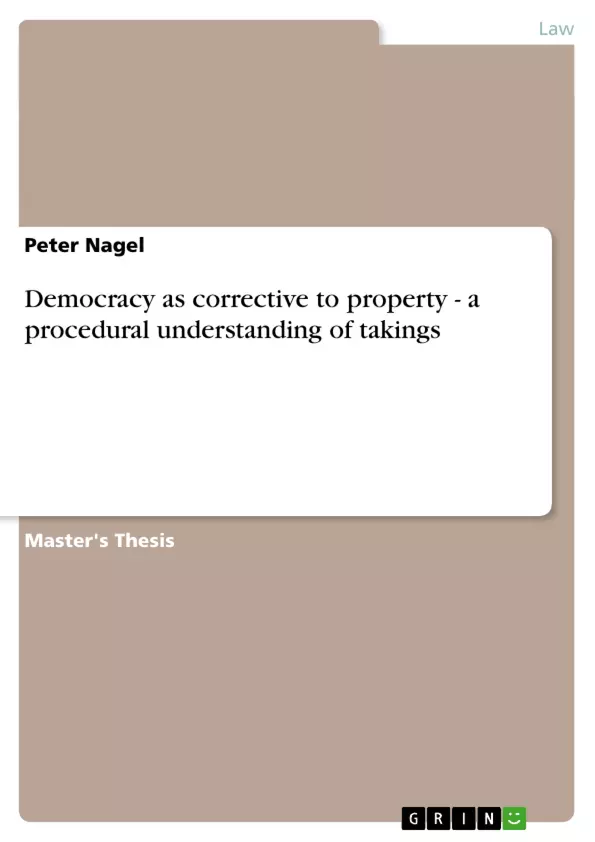The procedural understanding of constitutional provisions has
undergone a remarkable development over the last decades. Beginning with a footnote by Justice Stone in Carolene Products, procedure was found to be the appropriate basis for judicial review and made its way into public choice theory. One of the more recent contributions is Professor Habermas’s discourse theory as philosophical response to the emergence of pluralist “lifeworlds” within modern Occidental communities. Whereas the academic awareness of procedural issues seems to have progressed from quite specific legal questions to general philosophical problems, I would like to address them from the reverse perspective. What does philosophy have to say about constitutional interpretation? More specifically, what are the implications of Habermas's "discourse theory" for the understanding of takings? To answer these issues, Part I presents discourse theory as an alternative legal concept to natural law and legal positivism as applied by the American and German constitutional courts in the context of takings. In Part II, I shall claim that the discoursive approach can help to promote a procedural understanding of the Just Compensation Clause. Part III, finally, uses the philosophical background of
discourse theory to test procedural recommendations of public choice theory.
Inhaltsverzeichnis (Table of Contents)
- INTRODUCTION
- I. DISCOURSE THEORY AS MODEL TO RECONCILE “FACTICITY” AND “VALIDITY” OF LAW
- Deficiencies of Natural Law and Legal Positivism
- Habermas's Discoursive Approach
- Supreme Court's Inconsistency
- Federal Constitutional Court's Positivism
- Relevance for Takings
- II. DISCOURSE THEORY AND THE JUST COMPENSATION CLAUSE
- Courts' Obligation to Remedy Procedural Deficiencies
- Procedural Interpretation of the Just Compensation Clause
- Discourse Theory and its Procedural Benchmarks
- Implementation into Takings Jurisprudence
- III. DISCOURSE THEORY VS. PUBLIC CHOICE THEORY
- Public Choice Theory Revisited
- Discoursive Critique of Public Choice Theory in the Context of Takings
- Public Choice Holdings
- Discoursive Response to Fischel
- "Exit" and its Communicative Value
- "Exit" as Proxy
- CONCLUSION
Zielsetzung und Themenschwerpunkte (Objectives and Key Themes)
This thesis argues that a procedural understanding of the takings clause is crucial for reconciling the "facticity" and "validity" of law. Drawing on Habermas's discourse theory, the author explores how a procedural approach can address the shortcomings of natural law and legal positivism, ultimately offering a framework for the interpretation and application of the takings clause.- The role of discourse theory in reconciling the "facticity" and "validity" of law
- The limitations of natural law and legal positivism in explaining the takings clause
- The procedural interpretation of the just compensation clause through discourse theory
- The application of discourse theory to the takings jurisprudence in the context of public choice theory
- The communicative value of "exit" as a procedural benchmark in the discourse theory framework
Zusammenfassung der Kapitel (Chapter Summaries)
The first chapter introduces the concept of discourse theory as a model to bridge the gap between "facticity" and "validity" in law. It critiques the deficiencies of natural law and legal positivism, highlighting the limitations of both frameworks in understanding the complexities of the takings clause.Chapter II explores the application of discourse theory to the just compensation clause. It outlines the obligation of courts to address procedural deficiencies and proposes a procedural interpretation of the clause, emphasizing the importance of discursive benchmarks.
Chapter III contrasts discourse theory with public choice theory in the context of takings. It analyzes the shortcomings of public choice theory in explaining the takings clause and proposes a discursive response to its shortcomings, particularly highlighting the communicative value of "exit".
Schlüsselwörter (Keywords)
The core concepts explored in this thesis include discourse theory, takings clause, just compensation clause, legal positivism, natural law, public choice theory, procedural justice, communicative action, and "exit" as a procedural benchmark. The thesis delves into the intersection of legal theory, political philosophy, and constitutional law in analyzing the complexities of the takings clause through a procedural lens.Frequently Asked Questions
What is the central argument of the thesis regarding takings?
The thesis argues that a procedural understanding of the takings clause, based on Habermas's discourse theory, is essential to reconcile the "facticity" and "validity" of law.
How does Habermas's discourse theory apply to constitutional law?
It serves as an alternative to natural law and legal positivism by focusing on the communicative process and procedural benchmarks to ensure legal validity in pluralist societies.
What are the deficiencies of legal positivism according to the author?
The author suggests that positivism fails to fully address the complexities of constitutional interpretation in takings cases, often leading to inconsistencies in court rulings.
What is the role of the Just Compensation Clause in this context?
The thesis proposes a procedural interpretation of the clause, where courts have an obligation to remedy procedural deficiencies in the legislative or administrative process.
How does the author view "Exit" in public choice theory?
From a discursive perspective, "exit" is analyzed for its communicative value and its function as a procedural benchmark for justice in takings jurisprudence.
- Citation du texte
- Dr. Peter Nagel (Auteur), 1999, Democracy as corrective to property - a procedural understanding of takings, Munich, GRIN Verlag, https://www.grin.com/document/114854



